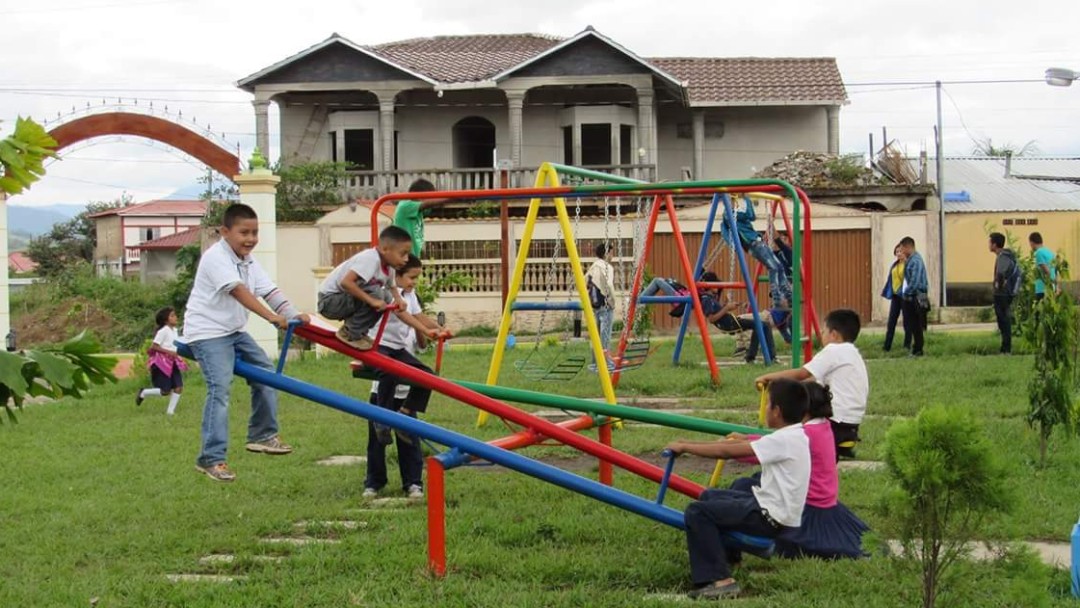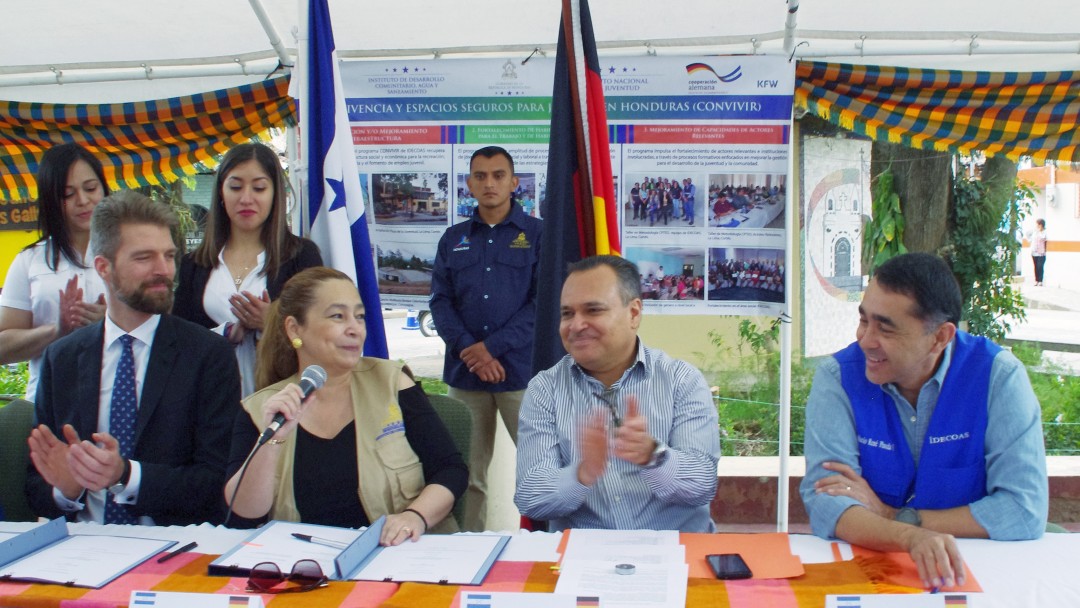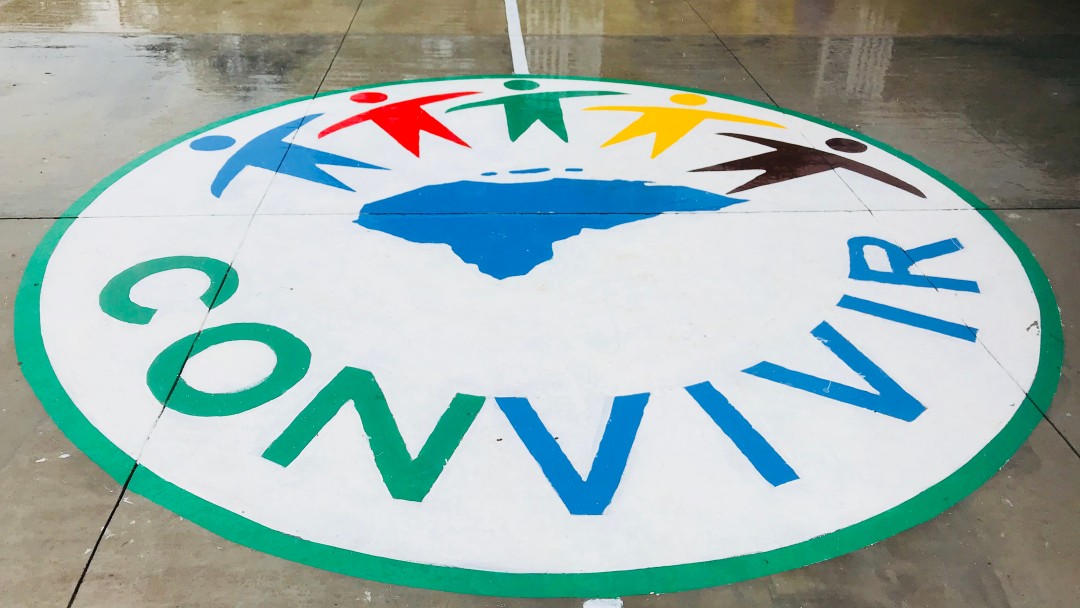News from 2019-04-18 / KfW Development Bank
Containing violence in Honduras
KfW is working towards more peaceful coexistence

Honduras is one of the countries with the highest murder rates in the world. Youth gangs are up to no good and sexual assaults, drug offences and robberies are part of the hard everyday life of this Central American country. Apart from violence, poverty and lack of prospects are major reasons why thousands of Hondurans leave their country for the United States every year. There, the migrants on the southern border have become an explosive political issue.
In order to help break the spiral of violence KfW has now launched the second phase of a programme for the prevention of youth violence, one of the aims of which is to refurbish public places and thus make them safer. The idea behind this is that an intact infrastructure and well-visible, well-lit public spaces have a deterrent effect on potential perpetrators. Furthermore, a feeling of togetherness is created when people populate a place, meet, talk, play or do sports. There is literally less room for violence. This is why the programme is called "CONVIVIR", the Spanish word for "living together".
Young people as a target group
With the signing of an FC loan amounting to EUR 6 million on budget funds from the German Federal Ministry for Economic Cooperation and Development (BMZ) in Honduras in the presence of the Minister of Finance, Rocío Izabel Tábora Morales, and the KfW office director Jan Stilke, the starting signal was given for the second part of the youth violence programme CONVIVIR. In addition, the Honduran state is contributing EUR 600,000, and the participating municipalities and the target group each contribute another EUR 300,000. The borrower is the Republic of Honduras, represented by the Ministry of Finance. The politically responsible body is the National Youth Institute. The Honduran social fund IDECOAS-FHIS is in charge of the implementation.
Like CONVIVIR I, the follow-up programme is also aimed at adolescents and young adults between 12 and 30 years of age who live in marginalised urban districts with high levels of violence. This is because young people are not only victims of violence, but are often perpetrators. Priority measures include the construction and revitalisation of sports, cultural and leisure facilities, youth and training centres, children's playgrounds and public squares and parks.
Young people decide and participate
In selecting the municipalities, criteria such as the rate of violence, the proportion of young people in the population and the existence of youth and violence prevention plans are applied. The precise infrastructure measures to be implemented, what to change and how, is decided by municipal administrations together with local district committees in which young people and their families are involved.
The procedure follows, and this is the special feature of the programme, the so-called "PEC" approach (Proyectos Ejecutados por la Comunidad), which means: the population itself implements the projects. PEC has already proved its effectiveness in the previous phase, as the local residents are not only involved in the selection of measures, but also work on the construction sites themselves. In addition, all those involved jointly draw up plans on how the sites are to be used and maintained so that they remain attractive in the long term. The joint approach creates a sense of unity and the population identifies with the new, safe spaces. This leads to the fact that the young people and their families enjoy spending time together there and use the rooms actively.

A further component of the programme includes the strengthening of social skills of young people through various education and training programmes. For example, they can acquire basic technical qualifications in information technology, electronics, but also in hairdressing, bricklaying or baking. There are also courses that help the young people to improve their social skills. This strengthens their self-confidence, increases their chances on the labour market and in turn contributes to a productive and peaceful coexistence.
A third component of the programme increases the skills and structures of involved actors from city administrations and supporting organisations, so that they can better fulfil their role in dealing with young people.
Removing a major obstacle to development
With its special focus on disadvantaged young people and problematic urban districts, KfW Development Bank is making a contribution to pacifying a country in a region that has been sinking into violence for decades and for which violence has become a serious obstacle to development. KfW also supports similar programmes in El Salvador and Guatemala. Counteracting violence helps not only the countries themselves, but also the region as a whole.


Share page
To share the content of this page with your network, click on one of the icons below.
Note on data protection: When you share content, your personal data is transferred to the selected network.
Data protection
Alternatively, you can also copy the short link: https://www.kfw-entwicklungsbank.de/s/enzBWrMC.B-pA
Copy link Link copied